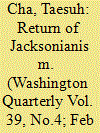| Srl | Item |
| 1 |
ID:
166580


|
|
|
|
|
| Summary/Abstract |
This article analyses competing discourses on a postmodern world order perpetuated by the United States and the People’s Republic of China (PRC), which are themselves built on their own pre-modern or early modern (inter)state models. Among several dimensions of the growing struggle between the two superpowers, this article focuses on their contestation of global norms or the standard of civilization regarding the question of world governance. What is unique in the contemporary competition between America and China is the fact that both countries aim to alter the fundamental organizing principle of modern world politics; they are against not only the balance of power system but also the imperial order, both of which originated from the modern European system. Indeed, Washington and Beijing strive to offer a third organizing principle beyond the conventional dyad in the modern discipline of international relations (IR) of anarchy and hierarchy. In terms of an analytic framework, this article explores the constitutive processes of self-identity formation in America and China against the European other (the Westphalian system and imperialism), thereby demonstrating the two states’ exceptionalist doctrines and their alternative visions for a postmodern world order.
|
|
|
|
|
|
|
|
|
|
|
|
|
|
|
|
| 2 |
ID:
150971


|
|
|
|
|
| Summary/Abstract |
The rise of President-elect, Donald J. Trump, and his unconventional policy remarks have inspired alarm across the political spectrum in the United States and throughout the world.
|
|
|
|
|
|
|
|
|
|
|
|
|
|
|
|
| 3 |
ID:
157759


|
|
|
|
|
| Summary/Abstract |
Does President Donald J. Trump have a coherent statecraft? Can we find a
consistent grand strategy in this new administration, worth calling the “Trump
Doctrine”? Mainly supported by angry Jacksonian folks who have been frustrated
with economic polarization and racial anxiety, Trump’s foreign policy idea
resonates well with European realism. Considering the fact that realist theory has
been confined to the margins of public discourse in post–Cold War America, this
unexpected return of the realist doctrine on the U.S. political scene needs to be
explained. Why are we suddenly approaching realism’s moment in foreign policy?
What makes prominent realists express their best wishes to President Trump?
In this article, we focus on the historical parallel between two maverick presidents
in modern U.S. history, Richard Nixon and Donald Trump. In particular, it is argued
that the realities of the United States’ relative decline induced the Nixon and Trump
administrations to embark on an unconventional course of realpolitik in world
politics. The U.S. leadership in the early 1970s strived to adjust to a condition in
which U.S. dominance was no longer as certain as in the early years of the postwar
times by adopting unorthodox statecraft amid profound political polarization.
Seemingly, the same story applies to the present administration. By attacking the
liberal consensus of the establishment, domestic and international, the Trump
government tries to “make America great again” in another era of increased stress.
Confronting an emerging multipolar international system and the collapse of the
existing national consensus, dramatic shifts in policies have been implemented to
ensure that the United States will remain a hegemonic power on the world scene.
|
|
|
|
|
|
|
|
|
|
|
|
|
|
|
|